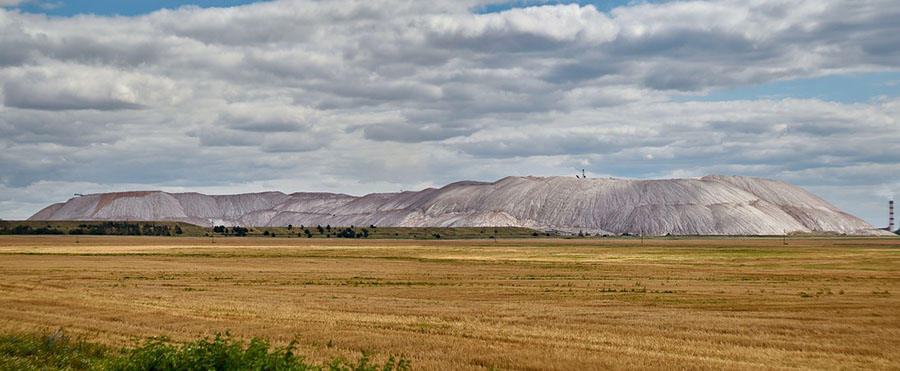Andrea Rubakovic: We are expecting a cautious global potash market for the remainder of the year. Chinese and Indian potash demand is slowing. Demand from developing nations in general is softening due to economic concerns in the U.S. and Europe. Nevertheless, we believe that the combination of existing producers' supply management and foreseen difficulties in bringing new supply onstream should keep global potash markets relatively balanced. So potash prices should be at steady levels in the short and medium terms. In the longer term though, we believe fundamental demand drivers for potash are intact and we are bullish on the industry's prospects. We expect to see demand rising in order to supply more and better-quality food to a growing global population from a relatively finite area of arable land.
TER: A number of potash projects are under development. Do you expect to see them reach production?
AR: Current potash producers have announced significant brownfield expansions and a number of junior players around the world are developing greenfield potash projects. However, some brownfield projects under construction today may have high costs and could take as long to reach full operational capability as a greenfield mine would.
On the greenfield front, we have seen negative development announcements from most major projects, which is a positive for the supply-demand balance. Just this morning, K+S Potash Canada (SDFG:FSE), which is in the early stages of developing its Legacy project in Saskatchewan, announced capital expenditures (capex) escalation and delayed timelines. In addition, EuroChem, a privately held company that is advancing two projects in Russia, has encountered a number of delays, while Vale S.A. (VALE:NYSE) recently announced suspension of work on its greenfield project in Argentina due to escalating costs. We have historically viewed BHP Billiton Ltd.'s (BHP:NYSE; BHPLF:OTCPK) Jansen project as the most serious risk to the potash supply-demand balance, and while the company continues to perform development work at its site in Saskatchewan, it has yet to receive formal board approval.
On the junior greenfield development front, a number of companies have significantly derisked their projects from a technical perspective. Some have completed feasibility studies and a few have secured the required environmental permits. The investment thesis a few years ago was that reaching these milestones could spark large investment by Indian, Chinese and Brazilians entities looking to secure fertilizer supplies. We have seen investments made in the sector since then; however, no overwhelming inflow of capital or straight takeovers by these parties has taken place. The main theme we are now seeing is that the junior potash companies are suffering the same fate as most junior miners: a challenging financing environment is hindering project progress.
We believe that only a small portion of greenfield developers will ultimately finance and construct their projects, and those that do are likely to experience significant delays in production start times and overruns in costs. The present challenging financing environment will filter these projects, and only the highest-quality projects or those with unique strategic appeal will develop further.
TER: Many projects these days need to have offtake agreements in place in order to have any chance of getting into production. Is this the new norm?
AR: Yes. Strategic partnerships and/or offtake agreements help mitigate the financing risk. They make project debt and equity financing easier to obtain. We view offtake agreements with an equity stake in a particularly positive light; those agreements represent a higher level of commitment.
TER: I see that you just initiated coverage on MBAC Fertilizer Corp. (MBC:TSX; MBCFFOTCQX) in January. What's the story there?
AR: Brazil is one of the world's fastest-growing potash and phosphate consumers and a leading importer. It is one of the few countries in the world with an underutilized land base and a favorable climate to facilitate continued expansion of cultivated land. The country currently imports 50% of its annual phosphate needs and is estimated to have the largest demand growth profile of any major phosphate consumer.
Furthermore, MBAC has a very knowledgeable management team with over 150 years of combined experience in development and financing of fertilizer projects in Brazil. The company's CEO, Antenor Silva Jr., helped develop an innovative phosphate metallurgical process that led to highly profitable development and growth for phosphate fertilizer production in Brazil.
MBAC intends to become a significant integrated producer of fertilizers in the Brazilian and Latin American markets. The company is developing a number of fertilizer projects in Brazil, and we believe it is positioned to greatly benefit from the country's large demand growth profile, stable political environment and a well-developed infrastructure.
The company's flagship Itafos phosphate project, located in central and northern Cerrado—the center of Brazil's largest agricultural region and new agricultural frontier—is expected to reach initial production later this year. The company addressed certain development issues at Itafos earlier this year, and we believe MBAC is on track to realize its potential upside if it successfully executes this project. On top of that, we believe that MBAC is a potential takeover target by a Brazilian entity that appears to have intentions to consolidate the Brazilian fertilizer sector and is already a large shareholder of the company.
TER: You also cover Encanto Potash Corp. (EPO:TSX.V). How does that situation look at this point?
AR: Encanto is another interesting company that is developing a potash play in Saskatchewan through a joint venture with the Muskowekwan First Nations group. The Muskowekwan project is relatively earlier stage compared to other Saskatchewan companies in our coverage universe, but we believe it stands to benefit from working directly and exclusively with the First Nation group through a significantly faster permitting and development process compared to negotiating with multiple land-owners.
In February, Encanto announced it is in talks with India's Rashtriya Chemicals and Fertilizers Ltd., a state-owned fertilizer and chemical marketer that represents a consortium of Indian fertilizer companies. They have not yet struck an agreement for future potash sales, but it's certainly encouraging that Encanto is holding these discussions. Just keep in mind that an announcement of discussions certainly does not ensure signing and completion of an offtake agreement.
Our long-term view is that completion of a positive feasibility study and receipt of the Environmental Impact Assessment (EIA) approval are necessary hurdles to pass before an offtake agreement and financing are secured; we would remind investors that these were the necessary obstacles to overcome for Potash One before being taken out by K+S. We believe the entry of a strategic partner, acquirer or offtake partner is more likely when a company completes its bankable feasibility study and receives the necessary EIA approval.
TER: Karnalyte Resources Inc. (KRN:TSX) is another company you cover. How do its prospects look at this time?
AR: Karnalyte is focused on bringing its Wynyard potash project in Saskatchewan to production. We like that the project and plant have been designed so they can be built in stages; this offers significant advantages in terms of capex. Even though we are discouraged by the large number of producers already looking to develop potash projects in Saskatchewan, we feel the high quality of the project and phased approach to production separate the Wynyard project from others in the basin as having the best chances of being financed through construction.
Gujarat State Fertilizers & Chemicals made a CA$45 million strategic investment and offtake agreement in the company early this year. We viewed this as a big vote of confidence in the project and believe the entry of the strategic partner and offtake partner marked the beginning of wider project-financing activities for Karnalyte. Our understanding is that Karnalyte will continue its discussions with other potential strategic partners, the entry of which we view to be a strong possibility. We believe there's room for a second strategic investor to enter the picture in the near term.
TER: You recently visited Allana Potash Corp.'s (AAA:TSX; ALLRF:OTCQX) project in Ethiopia and just increased your 12-month target price. What would be the catalysts to cause that substantial move from the current price?
AR: Allana's is another interesting story we have been following for a while. The company's focus is on developing a potash project in Ethiopia. This is expected to be one of the lowest-cost potash projects globally due to shallow depths of mineralization and a favorable hot climate that should allow for solar evaporation, materially lowering energy costs in the solution-mining process. We also like that the company is uniquely situated to appeal to key import markets in India and China and enjoys long-standing financial support from strategic investors, IFC, a member of the World Bank Group, and Liberty Metals and Mining Holdings. We are also encouraged by the Ethiopian government's support for companies such as Allana as part of its commitment to move Ethiopia from an agricultural to an industrial economy.
We upgraded our target price after the company significantly derisked the project with a positive feasibility study earlier this year. We expect the receipt of the Environmental, Social and Health Impact Assessment and the mining license, anticipated for receipt later this quarter, to serve as significant catalysts for the story. In addition, we are encouraged by the advanced offtake discussions the company is conducting with a number of parties and strategic partners. We feel that combined, these mark the project as a high candidate to be financed through production—no small feat in today's unfavorable financing environment.
TER: What level of risk do companies that export from the port of Djibouti face, considering the reports of piracy in the area?
AR: The piracy problem appears to be winding down as the presence of Somali pirates, who have historically been plaguing the waters surrounding the Horn of Africa, have effectively been shut down in the past two years due to a large military presence by a number of countries in the port of Djibouti and surrounding areas. This is a very positive data point for anyone planning to transfer goods in this region.
TER: What's your strategy on how investors should approach potash stocks in the current market environment to minimize risks and take best advantage of the opportunities you see now?
AR: A lot of the junior and small-cap stocks have been crushed in the current market, along with the stocks in the junior potash developer sector. We believe in strong long-term demand drivers for potash; the depressed prices present opportunities to accumulate shares of select junior potash developers. However, we caution that due to the large number of companies present in the universe, focusing on the highest-quality names is imperative.
We favor companies that have strong management teams, appeal to strategic investors or have distinct advantages in capital and other costs. The quality of the project, presence and likelihood of offtake partners, the cash balance and the potential sources of funding are all hugely important.
TER: Thank you for sharing your market insights with us.
AR: Thanks for having me.
Andrea Rubakovic is a research analyst covering the Canadian agriculture and fertilizer sectors. Prior to joining Salman, Rubakovic worked for a Toronto specialist investment firm, researching the Canadian resource sector. She graduated from the University of Toronto, Rotman School of Management.
Want to read more Energy Report interviews like this? Sign up for our free e-newsletter, and you'll learn when new articles have been published. To see a list of recent interviews with industry analysts and commentators, visit our Interviews page.
DISCLOSURE:
1) Zig Lambo conducted this interview for The Energy Report and provides services to The Energy Report as an employee or as an independent contractor. He or his family own shares of the following companies mentioned in this interview: None.
2) The following companies mentioned in the interview are sponsors of The Energy Report: None. Streetwise Reports does not accept stock in exchange for its services or as sponsorship payment.
3) Andrea Rubakovic: I or my family own shares of the following companies mentioned in this interview: None. I personally am or my family is paid by the following companies mentioned in this interview: None. My company has a financial relationship with the following companies mentioned in this interview: Salman Partners Inc. has provided investment banking services to MBAC Fertilizer Corp. and Allana Potash Corp. For a complete list of disclosures, please contact Salman Partners Inc. at SalmanResearch@salmanpartners.com. I was not paid by Streetwise Reports for participating in this interview. Comments and opinions expressed are my own comments and opinions. I had the opportunity to review the interview for accuracy as of the date of the interview and am responsible for the content of the interview.
4) Interviews are edited for clarity. Streetwise Reports does not make editorial comments or change experts' statements without their consent.
5) The interview does not constitute investment advice. Each reader is encouraged to consult with his or her individual financial professional and any action a reader takes as a result of information presented here is his or her own responsibility. By opening this page, each reader accepts and agrees to Streetwise Reports' terms of use and full legal disclaimer.
6) From time to time, Streetwise Reports LLC and its directors, officers, employees or members of their families, as well as persons interviewed for articles and interviews on the site, may have a long or short position in securities mentioned and may make purchases and/or sales of those securities in the open market or otherwise.



























































